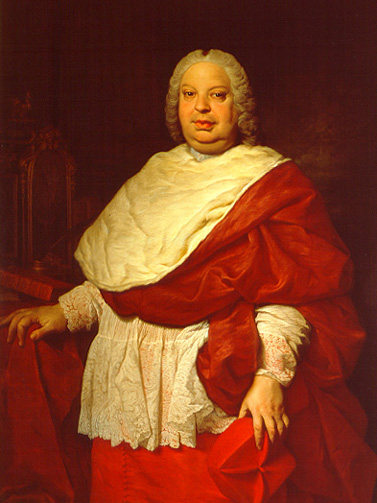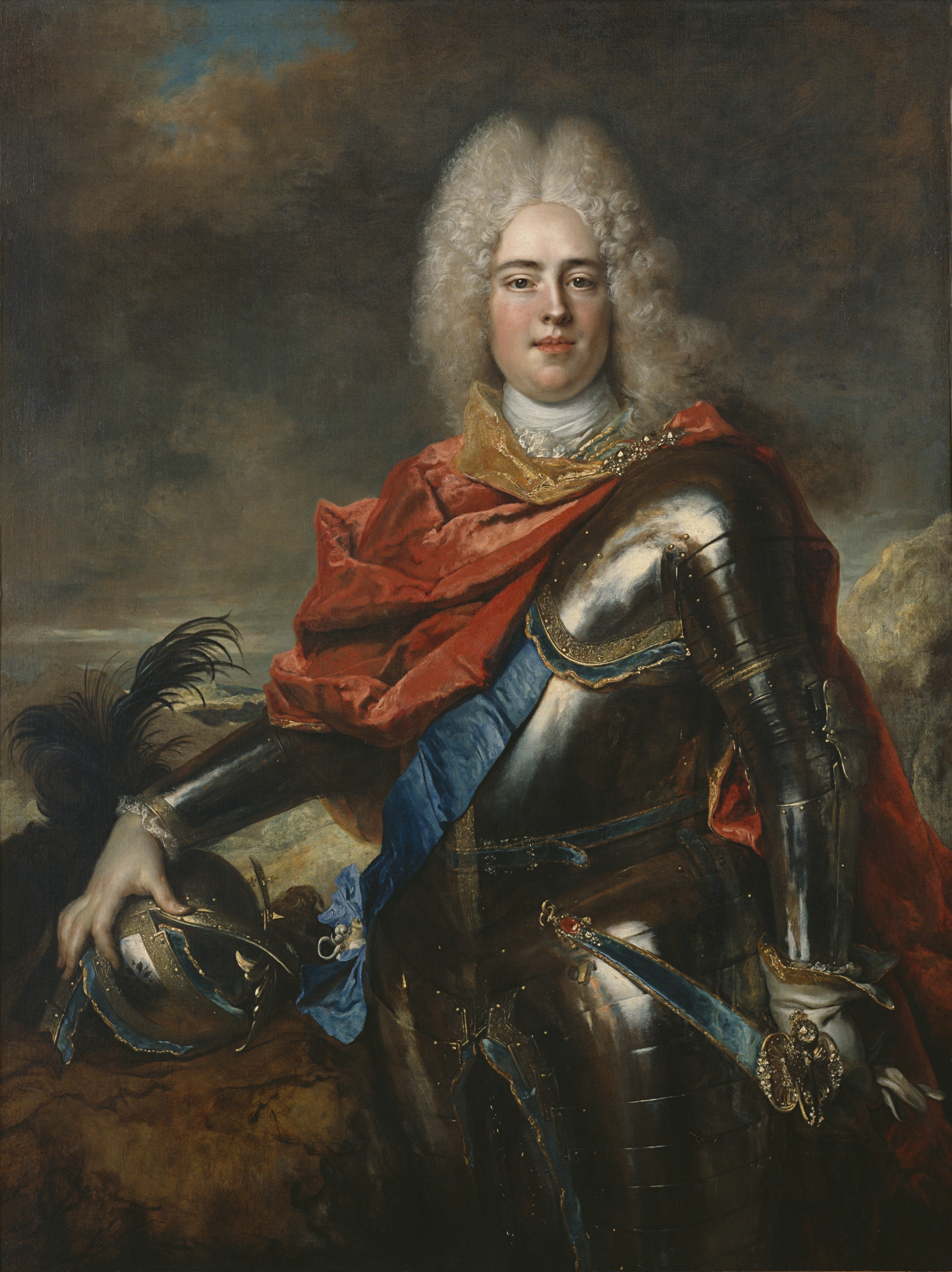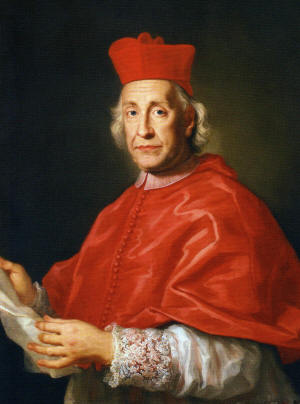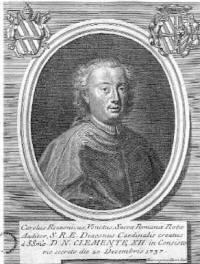|
Benedetto Stay
Benedetto Stay (1714–1801) was a Ragusan Roman Catholic clergyman, educated by Jesuits, he attended the academic assemblies of Marin Sorgo, beginning the composition of a poem on Alexander Farnese. Later on he published "Saggio sull'uomo", based on the system of Descartes. Life Stay came from the Stay family from Antivari (Bar) (now Montenegro). His grandfather, after whom he was named, was a painter. At the age of 28, he journeyed to Rome and became the pupil of Silvio Valenti Gonzaga at the Sapienza University of Rome. Pope Clement XIII conferred on him the position of secretary of Latin letters and Clement XIV named him ''Head of the Secretariat''. He died on February 25, 1801. Works He was the author of two Latin poems, one on the Cartesian philosophy in 6 books (Venice 1744) and the other on that of Newton in 10 books (1755–1792). Besides, he wrote three orations: one on the death of Clement XII, one for the election of his successor, and the third on the death of Au ... [...More Info...] [...Related Items...] OR: [Wikipedia] [Google] [Baidu] |
Dubrovnik
Dubrovnik (), historically known as Ragusa (; see notes on naming), is a city on the Adriatic Sea in the region of Dalmatia, in the southeastern semi-exclave of Croatia. It is one of the most prominent tourist destinations in the Mediterranean, a seaport and the centre of the Dubrovnik-Neretva County. Its total population is 42,615 (2011 census). In 1979, the city of Dubrovnik was added to the UNESCO list of World Heritage Sites in recognition of its outstanding medieval architecture and fortified old town. The history of the city probably dates back to the 7th century, when the town known as was founded by refugees from Epidaurum (). It was under the protection of the Byzantine Empire and later under the sovereignty of the Republic of Venice. Between the 14th and 19th centuries, Dubrovnik ruled itself as a free state. The prosperity of the city was historically based on maritime trade; as the capital of the maritime Republic of Ragusa, it achieved a high level of develo ... [...More Info...] [...Related Items...] OR: [Wikipedia] [Google] [Baidu] |
Silvio Valenti Gonzaga
Silvio Valenti Gonzaga (1 March 1690 – 28 August 1756) was an Italian nobleman and Catholic cardinal. Gonzaga was born in Mantua. He served as papal nuncio to Flanders, 1731–1736, and was elevated to the rank of cardinal in 1738 by Pope Clement XII. On 15 May 1747 he was given the titular church of San Callisto. He died in Viterbo Viterbo (; Viterbese: ; lat-med, Viterbium) is a city and ''comune'' in the Lazio region of central Italy, the capital of the province of Viterbo. It conquered and absorbed the neighboring town of Ferento (see Ferentium) in its early history .... He owned a large collection of paintings (including the '' Portrait of Lorenzo Cybo''), which, after his death, was sold on 18 May 1763 at Amsterdam and the paintings by Salvator Rosa and Francesco Solimena dispersed in several locations. References 1690 births 1756 deaths Clergy from Mantua 18th-century Italian cardinals Cardinal-bishops of Sabina Cardinal Secretaries of State M ... [...More Info...] [...Related Items...] OR: [Wikipedia] [Google] [Baidu] |
1801 Deaths
Eighteen or 18 may refer to: * 18 (number), the natural number following 17 and preceding 19 * one of the years 18 BC, AD 18, 1918, 2018 Film, television and entertainment * ''18'' (film), a 1993 Taiwanese experimental film based on the short story ''God's Dice'' * ''Eighteen'' (film), a 2005 Canadian dramatic feature film * 18 (British Board of Film Classification), a film rating in the United Kingdom, also used in Ireland by the Irish Film Classification Office * 18 (''Dragon Ball''), a character in the ''Dragon Ball'' franchise * "Eighteen", a 2006 episode of the animated television series ''12 oz. Mouse'' Music Albums * ''18'' (Moby album), 2002 * ''18'' (Nana Kitade album), 2005 * '' 18...'', 2009 debut album by G.E.M. Songs * "18" (5 Seconds of Summer song), from their 2014 eponymous debut album * "18" (One Direction song), from their 2014 studio album ''Four'' * "18", by Anarbor from their 2013 studio album '' Burnout'' * "I'm Eighteen", by Alice Cooper commonly ... [...More Info...] [...Related Items...] OR: [Wikipedia] [Google] [Baidu] |
1714 Births
Events January–March * January 21 – After being tricked into deserting a battle against India's Mughal Empire by the rebel Sayyid brothers, Prince Azz-ud-din Mirza is blinded on orders of the Emperor Farrukhsiyar as punishment. * February 7 – The Siege of Tönning (a fortress of the Swedish Empire and now located in Germany in the state of Schleswig-Holstein) ends after almost a year, as Danish forces force the surrender of the remaining 1,600 defenders. The fortress is then leveled by the Danes. * February 28 – (February 17 old style) Russia's Tsar Peter the Great issues a decree requiring compulsory education in mathematics for children of government officials and nobility, applying to children between the ages of 10 and 15 years old. * March 2 – (February 19 old style) The Battle of Storkyro is fought between troops of the Swedish Empire and the Russian Empire, near what is now the village of Napue in Finland. The outnumbered Swedish forces, under the c ... [...More Info...] [...Related Items...] OR: [Wikipedia] [Google] [Baidu] |
Niccolò Tommaseo
Niccolò Tommaseo (; 9 October 1802 – 1 May 1874) was a Dalmatian linguist, journalist and essayist, the editor of a ''Dizionario della Lingua Italiana'' in eight volumes (1861–74), of a dictionary of synonyms (1830) and other works. He is considered a precursor of the Italian irredentism. Biography Born at Sebenico (Šibenik), which was in quick succession under Venetian, Napoleonic and Habsburg domain, Tommaseo was culturally and ethnically Italian, but expressed also a genuine interest in the Illyrian popular culture. His education, pursued at Split/Spalato, was a humanistic one with a sound Catholic basis. He moved to Italy to graduate in law at the University of Padua in 1822. He then spent several years as a journalist roving between Padua and Milan, where he came in contact with Alessandro Manzoni and Antonio Rosmini-Serbati. In this period of life, he began his collaboration in the ''Antologia'' of Giovan Pietro Vieusseux, founder of the Gabinetto Vieusseux, the ... [...More Info...] [...Related Items...] OR: [Wikipedia] [Google] [Baidu] |
Francesco Maria Appendini
Francesco Maria Appendini (November 4, 1768 – 1837) was an Italian Latin and Italian scholar who studied Slavic languages in the Republic of Ragusa. The French invasion prevented him from returning to Italy, and he adopted Republic of Ragusa as his own country. He took it upon himself to investigate its history and antiquities. Early life Appendini was born at Poirino, near Turin, in 1768. Poirino was then part of the Kingdom of Piedmont-Sardinia. He received his early education in his native country, after which he went to Rome, where he entered the order of the Scolopj or Scholarum. The order (Christian Brotherhood) devoted itself to the education of students working as teachers in the colleges and schools of Italy and neighbouring countries. Having done his theological studies, Appendini moved to Ragusa (Dubrovnik), where he was appointed a professor of rhetoric in the college of the Scolopj. Literary works After several years of consulting the old documents and chronicles a ... [...More Info...] [...Related Items...] OR: [Wikipedia] [Google] [Baidu] |
August III
Augustus III ( pl, August III Sas, lt, Augustas III; 17 October 1696 5 October 1763) was King of Poland and Grand Duke of Lithuania from 1733 until 1763, as well as Elector of Saxony in the Holy Roman Empire where he was known as Frederick Augustus II (german: link=no, Friedrich August II). He was the only legitimate son of Augustus II the Strong, and converted to Roman Catholicism in 1712 to secure his candidacy for the Polish throne. In 1719 he married Maria Josepha, daughter of Joseph I, Holy Roman Emperor, and became Elector of Saxony following his father's death in 1733. Augustus was able to gain the support of Charles VI by agreeing to the Pragmatic Sanction of 1713 and also gained recognition from Russian Empress Anna by supporting Russia's claim to the region of Courland. He was elected king of Poland by a small minority on 5 October 1733 and subsequently banished the former Polish king Stanisław I. He was crowned in Kraków on 17 January 1734. Augustus was supportiv ... [...More Info...] [...Related Items...] OR: [Wikipedia] [Google] [Baidu] |
Clement XII
Pope Clement XII ( la, Clemens XII; it, Clemente XII; 7 April 16526 February 1740), born Lorenzo Corsini, was head of the Catholic Church and ruler of the Papal States from 12 July 1730 to his death in February 1740. Clement presided over the growth of a surplus in the papal finances. He thus became known for building the new façade of the Basilica of Saint John Lateran, beginning construction of the Trevi Fountain, and the purchase of Cardinal Alessandro Albani's collection of antiquities for the papal gallery. In his 1738 bull , he provides the first public papal condemnation of Freemasonry. Early life Lorenzo Corsini was born in Florence in 1652 as the son of Bartolomeo Corsini, Marquis of Casigliano and his wife Elisabetta Strozzi, the sister of the Duke of Bagnuolo. Both of his parents belonged to the old Florentine nobility. He was a distant relative of Saint Andrea Corsini. Corsini studied at the Jesuit Collegio Romano in Rome and also at the University of Pisa whe ... [...More Info...] [...Related Items...] OR: [Wikipedia] [Google] [Baidu] |
Venice
Venice ( ; it, Venezia ; vec, Venesia or ) is a city in northeastern Italy and the capital of the Veneto Regions of Italy, region. It is built on a group of 118 small islands that are separated by canals and linked by over 400 bridges. The islands are in the shallow Venetian Lagoon, an enclosed bay lying between the mouths of the Po River, Po and the Piave River, Piave rivers (more exactly between the Brenta (river), Brenta and the Sile (river), Sile). In 2020, around 258,685 people resided in greater Venice or the ''Comune di Venezia'', of whom around 55,000 live in the historical island city of Venice (''centro storico'') and the rest on the mainland (''terraferma''). Together with the cities of Padua, Italy, Padua and Treviso, Italy, Treviso, Venice is included in the Padua-Treviso-Venice Metropolitan Area (PATREVE), which is considered a statistical metropolitan area, with a total population of 2.6 million. The name is derived from the ancient Adri ... [...More Info...] [...Related Items...] OR: [Wikipedia] [Google] [Baidu] |
Clement XIV
Pope Clement XIV ( la, Clemens XIV; it, Clemente XIV; 31 October 1705 – 22 September 1774), born Giovanni Vincenzo Antonio Ganganelli, was head of the Catholic Church and ruler of the Papal States from 19 May 1769 to his death in September 1774. At the time of his election, he was the only Franciscan friar in the College of Cardinals, having been a member of OFM Conventual. To date, he is the last pope to take the pontifical name of "Clement" upon his election. During his pontificate, Clement decreed the suppression of the Society of Jesus. Early life Ganganelli was born in Santarcangelo di Romagna in 1705 as the second child of Lorenzo Ganganelli and Angela Serafina Maria Mazza. He received the sacrament of baptism on 2 November 1705. He initially studied at Verucchio but later received his education from the Society of Jesus at Rimini from 1717. He also studied with the Piarists of Urbino. Ganganelli entered the Order of Friars Minor Conventual on 15 May 1723 in F ... [...More Info...] [...Related Items...] OR: [Wikipedia] [Google] [Baidu] |
Pope Clement XIII
Pope Clement XIII ( la, Clemens XIII; it, Clemente XIII; 7 March 1693 – 2 February 1769), born Carlo della Torre di Rezzonico, was head of the Catholic Church and ruler of the Papal States from 6 July 1758 to his death in February 1769. He was installed on 16 July 1758. His pontificate was overshadowed by the constant pressure to suppress the Society of Jesus but despite this, he championed their order and also proved to be their greatest defender at that time. He was also one of the few early popes who favoured dialogue with Protestants and to this effect hoped to mend the schism with the Catholic Church that existed in England and the Low Countries. These efforts ultimately bore little fruit. Biography Early life Carlo della Torre di Rezzonico was born in 1693 to a recently ennobled family of Venice, the second of two children of the man who bought the unfinished palace on the Grand Canal (now Ca' Rezzonico) and finished its construction. His parents were Giovanni Ba ... [...More Info...] [...Related Items...] OR: [Wikipedia] [Google] [Baidu] |








.jpg)

